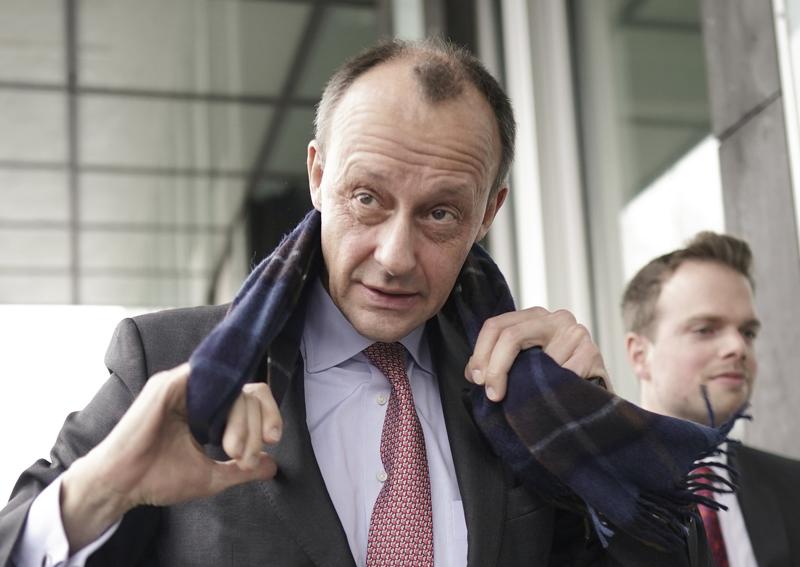 Friedrich Merz, former leader of the CDU/CSU parliamentary group in the Bundestag, leaves a press conference at the federal press conference on a possible candidacy for the CDU chairmanship, Feb 25, 2020. (MICHAEL KAPPELER / DPA VIA AP)
Friedrich Merz, former leader of the CDU/CSU parliamentary group in the Bundestag, leaves a press conference at the federal press conference on a possible candidacy for the CDU chairmanship, Feb 25, 2020. (MICHAEL KAPPELER / DPA VIA AP)
APOLDA — In a beer hall in eastern Germany, locals are toasting the man they are counting on to see out Chancellor Angela Merkel and her brand of liberal conservatism.
Friedrich Merz, whose line on Syrian asylum-seekers is “we can’t accept you here”, goes down well with his audience as he campaigns to succeed Merkel as leader of the Christian Democrats (CDU) and possibly the country.
Merz’s promise to shift the CDU to the right is as popular as the beer and herrings laid on to accompany his pitch to a party rally in the town of Apolda
Merz’s promise to shift the CDU to the right is as popular as the beer and herrings laid on to accompany his pitch to a party rally in the town of Apolda.
The CDU veteran is locked in a battle for the party’s soul with Armin Laschet, a centrist offering continuity after Merkel steps down in time for the next election, due by October 2021.
The CDU plans to pick a new leader at a special congress on April 25, with Merz currently leading Laschet in the polls by 35 percent to 24 percent.
At stake is Germany’s reputation - personified by Merkel - as Europe’s champion of the post-war liberal order, an issue now being blurred by the CDU’s domestic preoccupation with the rise of the far-right Alternative for Germany (AfD).
Whoever wins the CDU leadership faces the daunting challenge of uniting the party.
“Laschet is Merkel 2.0,” said Axel Zimmermann, 51, a bank clerk and one of 1,500 supporters who gave Merz a standing ovation at the beer hall rally in Apolda, a small, left-behind town in the eastern German state of Thuringia.
“Laschet will win elections and compromise to build coalitions, but he won’t be able to unite the CDU,” Zimmermann said. “Merz will take the CDU to the right. This will unite the CDU and weaken the AfD. What’s the point of winning elections if your party is falling apart?”
Straight-talking Merz, a 64-year-old lawyer, offers a socially conservative, pro-business pitch that appeals to the CDU’s core of mainly western, Catholic men who see Merkel - a Protestant from the east - as an anomaly.
Earlier this month Merz had a simple message for Syrian refugees who may be hoping to leave Turkey: “There is no point in coming to Germany.”
That strikes a chord in Thuringia, where Merkel’s decision in 2015 to open Germany’s borders to a million refugees fleeing war in the Middle East fueled the rise of the nationalist AfD.
By contrast, Laschet, 59, is making a more inclusive offer and last month won the support of Health Minister Jens Spahn, who appeals to some on the CDU’s more conservative wing, as a running mate.
“The CDU is bigger than either one of us, this is about the future of our country and the CDU,” said Spahn, adding it was time to build bridges within the party.
‘PARTY IN CRISIS’
Germany’s most successful political party since the end of World War Two is now struggling to find a way forward after many of its voters have fled to the far-right AfD and the leftist Greens.
ALSO READ: Merkel ally Laschet becomes front-runner to win party leadership
Merkel’s supporters, who back Laschet, premier of Germany’s most populous state of North Rhine-Westphalia, fear that any shift to the right will cost the CDU dearly at the ballot box.
They point to the Greens, now the second most popular party in opinion polls, as the main threat to the CDU, and say the conservatives should stick to the middle-ground strategy that has handed Merkel’s party four straight election victories.
But Merz’s supporters say Germany desperately needs a distinctively conservative party to counter the AfD, to which the CDU has lost most voters.
“We have a crisis and this is that we don’t know what we stand for anymore,” said Christian Sitter of the Werte Union, or Values Union, an ultra-conservative grouping in Merkel’s conservative bloc, which has ruled with the center-left Social Democrats (SPD) during 11 of the chancellor’s 15 years in power.
“Merkel has been more interested in surviving as chancellor than in uniting the party,” added Sitter. “To survive she cut wishy-washy deals with the SPD and silenced the conservative wing. Now we are saying we want to be heard again.”
The debate over what the CDU stands for and its position vis-à-vis the AfD came to a head in Thuringia last month, when CDU lawmakers sided with the AfD to elect a new state premier, shattering the post-war consensus among established parties of shunning the far right.
READ MORE: Merkel succession battle heats up with surprise new candidate
So great was the resulting controversy that the newly elected premier quit after a few days and Annegret Kramp-Karrenbauer, who defeated Merz to win the CDU leadership in December 2018, abandoned her ambitions to run for chancellor.
Her authority crushed, Kramp-Karrenbauer decided to step down - opening the way for Merz and Laschet to duke it out.
“We have two choices: more of the same or a new start,” Merz said to loud applause in Apolda. “And we choose a new start.”


